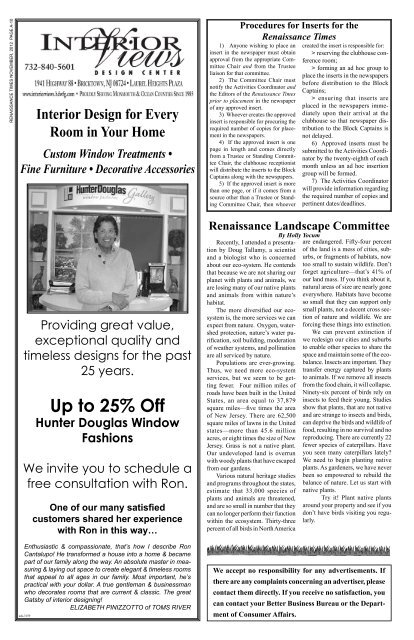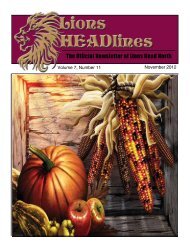RENAISSANCE TIMES - Senior Publishing Company
RENAISSANCE TIMES - Senior Publishing Company
RENAISSANCE TIMES - Senior Publishing Company
You also want an ePaper? Increase the reach of your titles
YUMPU automatically turns print PDFs into web optimized ePapers that Google loves.
<strong>RENAISSANCE</strong> <strong>TIMES</strong> NovEMbER, 2012 PAGE A-10<br />
Interior Design for Every<br />
Room in Your Home<br />
Custom Window Treatments •<br />
Fine Furniture • Decorative Accessories<br />
Providing great value,<br />
exceptional quality and<br />
timeless designs for the past<br />
25 years.<br />
Up to 25% Off<br />
Hunter Douglas Window<br />
Fashions<br />
We invite you to schedule a<br />
free consultation with Ron.<br />
One of our many satisfied<br />
customers shared her experience<br />
with ron in this way…<br />
Enthusiastic & compassionate, that’s how I describe Ron<br />
Cantalupo! He transformed a house into a home & became<br />
part of our family along the way. An absolute master in measuring<br />
& laying out space to create elegant & timeless rooms<br />
that appeal to all ages in our family. Most important, he’s<br />
practical with your dollar. A true gentleman & businessman<br />
who decorates rooms that are current & classic. The great<br />
Gatsby of interior designing!<br />
ELIZABETH PINIZZOTTO of TOMS RIVER<br />
ads-3159<br />
Procedures for Inserts for the<br />
Renaissance Times<br />
1) Anyone wishing to place an<br />
insert in the newspaper must obtain<br />
approval from the appropriate Committee<br />
Chair and from the Trustee<br />
liaison for that committee.<br />
2) The Committee Chair must<br />
notify the Activities Coordinator and<br />
the Editors of the Renaissance Times<br />
prior to placement in the newspaper<br />
of any approved insert.<br />
3) Whoever creates the approved<br />
insert is responsible for procuring the<br />
required number of copies for placement<br />
in the newspapers.<br />
4) If the approved insert is one<br />
page in length and comes directly<br />
from a Trustee or Standing Committee<br />
Chair, the clubhouse receptionist<br />
will distribute the inserts to the Block<br />
Captains along with the newspapers.<br />
5) If the approved insert is more<br />
than one page, or if it comes from a<br />
source other than a Trustee or Standing<br />
Committee Chair, then whoever<br />
created the insert is responsible for:<br />
> reserving the clubhouse conference<br />
room;<br />
> forming an ad hoc group to<br />
place the inserts in the newspapers<br />
before distribution to the Block<br />
Captains;<br />
> ensuring that inserts are<br />
placed in the newspapers immediately<br />
upon their arrival at the<br />
clubhouse so that newspaper distribution<br />
to the Block Captains is<br />
not delayed.<br />
6) Approved inserts must be<br />
submitted to the Activities Coordinator<br />
by the twenty-eighth of each<br />
month unless an ad hoc insertion<br />
group will be formed.<br />
7) The Activities Coordinator<br />
will provide information regarding<br />
the required number of copies and<br />
pertinent dates/deadlines.<br />
Renaissance Landscape Committee<br />
Recently, I attended a presentation<br />
by Doug Tallamy, a scientist<br />
and a biologist who is concerned<br />
about our eco-system. He contends<br />
that because we are not sharing our<br />
planet with plants and animals, we<br />
are losing many of our native plants<br />
and animals from within nature’s<br />
habitat.<br />
The more diversified our ecosystem<br />
is, the more services we can<br />
expect from nature. Oxygen, watershed<br />
protection, nature’s water purification,<br />
soil building, moderation<br />
of weather systems, and pollination<br />
are all serviced by nature.<br />
Populations are ever-growing.<br />
Thus, we need more eco-system<br />
services, but we seem to be getting<br />
fewer. Four million miles of<br />
roads have been built in the United<br />
States, an area equal to 37,879<br />
square miles—five times the area<br />
of New Jersey. There are 62,500<br />
square miles of lawns in the United<br />
states—more than 45.6 million<br />
acres, or eight times the size of New<br />
Jersey. Grass is not a native plant.<br />
Our undeveloped land is overrun<br />
with woody plants that have escaped<br />
from our gardens.<br />
Various natural heritage studies<br />
and programs throughout the states,<br />
estimate that 33,000 species of<br />
plants and animals are threatened,<br />
and are so small in number that they<br />
can no longer perform their function<br />
within the ecosystem. Thirty-three<br />
percent of all birds in North America<br />
By Holly Yocum<br />
are endangered. Fifty-four percent<br />
of the land is a mess of cities, suburbs,<br />
or fragments of habitats, now<br />
too small to sustain wildlife. Don’t<br />
forget agriculture—that’s 41% of<br />
our land mass. If you think about it,<br />
natural areas of size are nearly gone<br />
everywhere. Habitats have become<br />
so small that they can support only<br />
small plants, not a decent cross section<br />
of nature and wildlife. We are<br />
forcing these things into extinction.<br />
We can prevent extinction if<br />
we redesign our cities and suburbs<br />
to enable other species to share the<br />
space and maintain some of the ecobalance.<br />
Insects are important. They<br />
transfer energy captured by plants<br />
to animals. If we remove all insects<br />
from the food chain, it will collapse.<br />
Ninety-six percent of birds rely on<br />
insects to feed their young. Studies<br />
show that plants, that are not native<br />
and are strange to insects and birds,<br />
can deprive the birds and wildlife of<br />
food, resulting in no survival and no<br />
reproducing. There are currently 22<br />
fewer species of caterpillars. Have<br />
you seen many caterpillars lately?<br />
We need to begin planting native<br />
plants. As gardeners, we have never<br />
been so empowered to rebuild the<br />
balance of nature. Let us start with<br />
native plants.<br />
Try it! Plant native plants<br />
around your property and see if you<br />
don’t have birds visiting you regularly.<br />
We accept no responsibility for any advertisements. If<br />
there are any complaints concerning an advertiser, please<br />
contact them directly. If you receive no satisfaction, you<br />
can contact your Better Business Bureau or the Department<br />
of Consumer Affairs.



